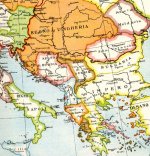I have just remembered that We already discussed here, from post 139 to about 153
http://www.eupedia.com/forum/thread...cans-albanians?p=393400&viewfull=1#post393400.
Still remains my full point fo view on the issue. We don't need to discuss anymore. The point is that Albanian Tosk is an exonym, and They weren't self-aware of a connection with Etruscans, of course. As we know, this connection doesn't exist, despite the claims of Albanian nationalists.
I add only this from Treccani:
Nell’ambito cancelleresco, amministrativo, giuridico, ecc., l’uso dell’italiano-fiorentino restava basato su conoscenze approssimative e condizionato dal volgare locale più a lungo di quanto accada nella lingua letteraria. Così, per es., le relazioni degli ambasciatori veneziani al Senato della Serenissima all’inizio del XVI secolo appaiono scritte in un volgare sostanzialmente toscano, cioè italiano, ma che conserva ancora elementi fonologici, morfologici e lessicali veneziani. Questo genere di lingua è chiamata spesso tosco-veneto. Nei decenni successivi i tratti locali vennero progressivamente abbandonati, e si giunse entro la fine del secolo a una pressoché completa toscanizzazione (Durante 1981: 163-164; Tomasin 2001: 158-164). L’adozione del modello toscano nel secondo Cinquecento e nel Seicento è un fenomeno che riguarda più in generale la lingua degli scriventi colti di tutta Italia. Da questo termine in avanti solo le scritture dei semicolti (➔ italiano popolare) presentano fenomeni di ibridismo tra la norma scritta nazionale, l’italiano, e la lingua parlata locale, il dialetto (Bartoli Langeli 2000).
http://www.treccani.it/enciclopedia/volgari-medievali_(Enciclopedia-dell'Italiano)/
It means that Venetians in the past wrote in a language more similar to Tuscan than spoken Venetian was (pay attention, the word
tosco-veneto doesn't have a real connection with we are discussing about, the etymology of Tosk).[/Qan
Self consciousness of Tosks either being or not related with Etruscans has nothing to do with the truth about history, either if they are really related. Etruscans disappeared many centuries ago , hence modern Tosks can't keep any historical popular memory. It would be like modern Greeks having any certain popular memory about their ancient past , without using classical writings studied by current scholars


